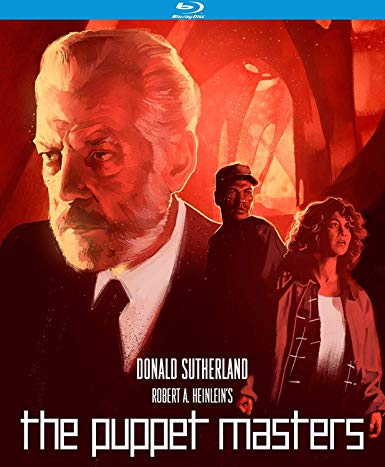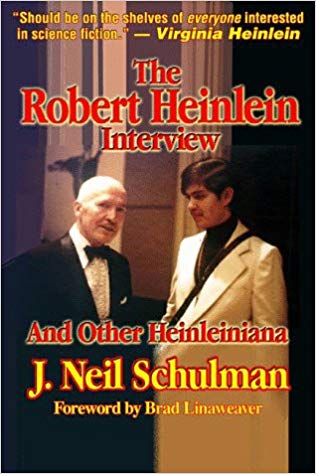|
|||||||||||||||||
November 2009 Web Edition Issue #3 |
|||||||||||||||||
| Mondo Cult Articles Features Interviews Reviews News Film Music Blog Forum Staff Back Issues Links Contact Us |

Robert A. Heinlein’sThe Puppet MastersKino Lorber's 2018 Blu-Ray ReleaseProducer | Heather Buckleyreviewed by J. Neil SchulmanBrad Linaweaver and I have in common, knowledge--both deep and wide--regarding the Dean of Science Fiction, Nebula Grandmaster Robert A. Heinlein. It’s no surprise therefore, that Brad a commentator on the documentary extra feature, “Robert A. Heinlein: The Puppet Grand Master,” accompanying the new Kino Lorber release of Robert A. Heinlein’s The Puppet Masters (Hollywood Pictures, 1994); nor that Brad asked me to comment on the new release. I started reading Heinlein’s young adult novels early–-around ten years old. I quickly became a fan and proceeded to his novels marketed to adults. So when in 1973 the Sunday editor of the New York Daily News assigned me to interview Heinlein, it was the author’s interview I’d been preparing for just about my entire life-–and it changed my life. My interview is available in the book The Robert Heinlein Interview and Other Heinleiniana, about which Virginia Heinlein wrote, "I've been encouraging Neil for years to bring out his interview with Robert as a book. To my knowledge, this is the longest interview Robert ever gave. Here is a book that should be on the shelves of everyone interested in science fiction. Libertarians will be using it as a source for years to come." I’ve also released the audio edition of my telephone interview with Heinlein at Agorist. In looking at the new Kino Lorber release, first let’s focus on the documentary extra feature, “Robert A. Heinlein: The Puppet Grand Master.” Literary agent Eleanor Wood, writer David Gerrold, book editor Robert Gleason, and author/filmmaker/magazine-publisher Brad Linaweaver give us deep background on the Heinlein who wrote the 1951 novel, The Puppet Masters. These are biographical facts on Heinlein most thoroughly examined in William Patterson’s two-volume biography of Heinlein, which came about due to Linaweaver recommending Patterson to Robert Heinlein’s widow, Virginia. Wood, Gerrold, and Gleason try to mold Heinlein’s views into a reflection of their own ideologies, with Linaweaver doing clean-up. For example David Gerrold denies that Heinlein was a libertarian. I can answer this assertion from my own personal experience when at a party Heinlein threw at a New York hotel in 1974 Heinlein introduced me around saying, “Neil and I are libertarians.”  As well, in my 1973 interview, Heinlein told me, “I would say that my position is not too far from that of Ayn Rand; that I would like to see government reduced to no more than internal police and courts, external armed forces with the other matters handled otherwise. I’m sick of the way the government sticks its nose into everything, now.” This is the libertarian Robert A. Heinlein that Brad Linaweaver introduces by showing the cover of the Heinlein tribute issue of uber-libertarian Samuel Edward Konkin III’s New Libertarian. Brad makes the point that no matter where he was on his ideological journey from Upton Sinclair EPIC socialist to Goldwater/Reagan free-marketeer, Heinlein was always fundamentally an advocate of the unfettered individual free mind and an opponent of totalitarianism whether communist or fascist. That’s the Heinlein who turned me into a libertarian before I’d ever heard the term. The main difference between Heinlein’s 1951 novel and the 1994 movie is that Heinlein’s novel is set in a future with cars that are equally functional on roads, in the air, and under the ocean--and where as a defense against the alien invaders social nudity can be readily adopted. The 1994 movie is adapted to be more contemporary in both technology and social mores. The Puppet Masters movie gives me a personal cross-over aside from Heinlein. Playing Secret Service Agent Hawthorne–-head of the President’s protection detail-–is Andrew Robinson, who had played President John F. Kennedy in the 1986 CBS Twilight Zone episode I wrote titled, “Profile in Silver.” I was on set for the episode’s production and with the blessing of director John D. Hancock, I was able to discuss with Andy how to, through performance, restore my libertarian intentions cut from dialogue after the script left my hands. The Puppet Masters is the most faithful attempt to bring Heinlein to the screen. It does not subvert Heinlein’s authorial intent in the way Paul Verhoeven’s Starship Troopers attempts, distorting Heinlein’s anti-draft premises into fascist premises. Brad does correct this in his comments. The other extra features on the creature design and interviews with cast members Julie Warner and Richard Belzer (kudos to Jessie Lilley, Associate Producer, for getting this latter) are also worthy. For the science-fiction movie buff, and aficionados of Heinlein in particular, the Kino Lorber release of Robert A. Heinlein’s The Puppet Masters is a needed acquisition.
|
||||||||||||||||




